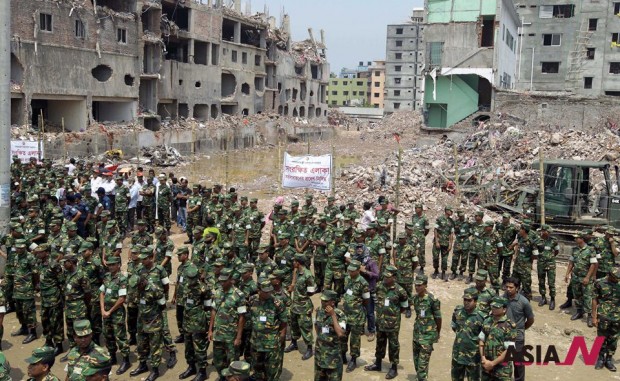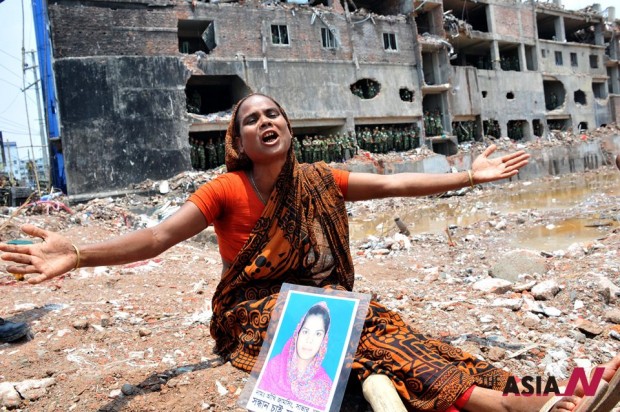Savar tragedy opens eyes to labour issues in Bangladesh’s RMG industry

Bangladesh army soldiers and others gather at the wreckage of a Bangladeshi garment factory building to offer prayers for the souls of the 1,127 people who died in the structureâs collapse last month, in Savar, near Bangladesh, Tuesday, May 14, 2013. The Islamic prayer service was held a day after the army ended the nearly three-week, painstaking search for bodies among the rubble of the worst tragedy in the history of the global garment industry and turned control of the site over to the civilian government for cleanup. <AP Photo/A.M. Ahad>
Rescue operation ends, leaves jolt for Bangladesh’s RMG industry
Dhaka – The rescue operation to recover the bodies from the rubble of the collapsed nine-storey Rana Plaza building in Savar near Bangladesh capital Dhaka came to an end on Monday (May 13) evening after 20 days. A total of 1,127 bodies were recovered from the debris of the building that housed five readymade garment (RMG) factories where about 4,000 workers, mostly women, were employed. The army-led salvage operation could rescue 2,438 persons alive.
The Rana Plaza collapse, considered as worst industrial accident in Bangladesh, occurred in the morning of April 24, when all the garment factories there were in operation. Cracks at several places of the building were noticed couple of days ago, but the owners of the building as well as garment factories ignored it and compelled the workers to work. The huge nine-storey building collapsed within minutes giving little opportunity to workers to come out alive and unhurt.
Just 20 minutes after the collapse, salvage operation started by a team of army headed by a Major General along with Fire Service, police, and other non-government rescuers. It was a very difficult task for the rescuers as the victims were trapped in tonnes of concrete debris. However, during the first six days of salvage operation, 2,437 persons were rescued alive and on the 17th day, a 19-year-old girl was rescued miraculously who survived in the rubbles with a bottle of water and few pieces of biscuits.
Now, the 20-days’ rescue operation is officially over, but the Rana Plaza disaster gave a serious jolt to Bangladesh’s garment industry that earns about 80 percent of country’s export income. Bangladesh has about 4,000 garment factories where over four million workers, mostly women, are employed. The country earns over US dollar 20 billion annually by exporting garments mostly to European countries, the USA, Canada and Australia.
Though the garment sector has been providing the country a large chunk of foreign exchange earning, yet the garment factories and its workers are virtually in miserable condition. Most of the garment factories are located in buildings which are not suitable for the purpose while the safety measures like fire exit are not adequate. As a result, a number of garment factories experienced severe accidents such as building collapse and fire incidents that claimed lives of 1,514 workers during the last 23 years.
Besides substandard condition of garment factories, the workers have also to pass miserable life due to the poor salary. A worker gets only US dollar 40 a month which is very small amount to survive. Moreover, working conditions and facilities for the workers are not satisfactory. Yet, they are compelled to work with poor salary and inhuman condition as they have no alternative. The workers of garment factories are also deprived of trade union rights.
Following the Savar building collapse tragedy and loss of lives of over 1,000 garment workers, the condition of Bangladesh’s garment industry as well as its workers surfaced that drawn attention of all concerned at home and abroad.

A woman mourns over her missing relative in front of the site of collapsed Rana Plaza building in Savar on the outskirts of Dhaka, Bangladesh, May 14, 2013. Twenty days into the collapse of the building when the confirmed death toll stands at 1,127, the rescuers wrapped up their recovery operations Tuesday morning. <Xinhua/Shariful Islam>
International human rights organizations raised questions about the safety and standard of life of Bangladesh garment workers. Pope Francis passed a comment on Bangladesh garment industry and described its workers as ‘slave labour’. Nobel Laureate Professor Muhammad Yunus of Bangladesh called for fair wages for garments workers which would allow them to lead decent lives. “We do not want to build our nation on slavery – but on our skills and our intellect”, he said.
The Savar building collapse tragedy and loss of lives of garment workers also raised concerns in the international business arena. The retailers or foreign buyers of Bangladeshi garments are also facing criticism as they buy the apparels from this country at a very cheap rate and earn huge profit.
Now they are under pressure to raise the price of Bangladeshi apparel and take steps to ensure better facilities for the workers. “The retailers or foreign buyers should take initiative to do it along with local manufacturers since the retailers enjoy the benefits”, observed the business analyst.
Meanwhile, leading European retailers including H&M, Inditex and Zara have come forward to ensure congenial atmosphere in the garment industry in Bangladesh providing steps for fire and building safety in the apparel industries in the country. The retailers have agreed to sign accord with Bangladesh government and authorities concerned in this regard.
That is a good news no doubt, and this is the first time the foreign retailers have shown interest for the garment industry and its workers. It can be expected that their initiative would help Bangladesh garment industry to survive and flourish.
The Bangladesh government, on Monday okayed a draft of new labour law that would give freedom for trade union activities for all workers. The new labour law would provide more rights and facilities for the industrial workers and it would also pave the way for trade union rights for the garment industry workers.
The Savar tragedy that claimed more than a thousand lives has opened the eyes of all stake holders. The problems should be solved right now to save the industry and its workers and to protect country’s export trade.













































